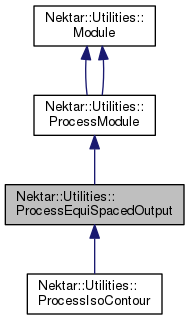|
Nektar++
|
|
Nektar++
|
This processing module interpolates one field to another. More...
#include <ProcessEquiSpacedOutput.h>


Public Member Functions | |
| ProcessEquiSpacedOutput (FieldSharedPtr f) | |
| virtual | ~ProcessEquiSpacedOutput () |
| virtual void | Process (po::variables_map &vm) |
| Write mesh to output file. More... | |
| virtual std::string | GetModuleName () |
 Public Member Functions inherited from Nektar::Utilities::ProcessModule Public Member Functions inherited from Nektar::Utilities::ProcessModule | |
| ProcessModule () | |
| ProcessModule (FieldSharedPtr p_f) | |
| ProcessModule (MeshSharedPtr p_m) | |
 Public Member Functions inherited from Nektar::Utilities::Module Public Member Functions inherited from Nektar::Utilities::Module | |
| Module (FieldSharedPtr p_f) | |
| void | RegisterConfig (string key, string value) |
| Register a configuration option with a module. More... | |
| void | PrintConfig () |
| Print out all configuration options for a module. More... | |
| void | SetDefaults () |
| Sets default configuration options for those which have not been set. More... | |
| bool | GetRequireEquiSpaced (void) |
| void | SetRequireEquiSpaced (bool pVal) |
| void | EvaluateTriFieldAtEquiSpacedPts (LocalRegions::ExpansionSharedPtr &exp, const Array< OneD, const NekDouble > &infield, Array< OneD, NekDouble > &outfield) |
| Module (MeshSharedPtr p_m) | |
| virtual void | Process ()=0 |
| void | RegisterConfig (std::string key, std::string value) |
| void | PrintConfig () |
| void | SetDefaults () |
| MeshSharedPtr | GetMesh () |
| virtual void | ProcessVertices () |
| Extract element vertices. More... | |
| virtual void | ProcessEdges (bool ReprocessEdges=true) |
| Extract element edges. More... | |
| virtual void | ProcessFaces (bool ReprocessFaces=true) |
| Extract element faces. More... | |
| virtual void | ProcessElements () |
| Generate element IDs. More... | |
| virtual void | ProcessComposites () |
| Generate composites. More... | |
| virtual void | ClearElementLinks () |
Static Public Member Functions | |
| static boost::shared_ptr< Module > | create (FieldSharedPtr f) |
| Creates an instance of this class. More... | |
Static Public Attributes | |
| static ModuleKey | className |
Protected Member Functions | |
| ProcessEquiSpacedOutput () | |
| void | SetupEquiSpacedField (void) |
| void | SetHomogeneousConnectivity (void) |
| void | GenOrthoModes (int n, const Array< OneD, const NekDouble > &phys, Array< OneD, NekDouble > &coeffs) |
 Protected Member Functions inherited from Nektar::Utilities::Module Protected Member Functions inherited from Nektar::Utilities::Module | |
| Module () | |
| void | ReorderPrisms (PerMap &perFaces) |
| Reorder node IDs so that prisms and tetrahedra are aligned correctly. More... | |
| void | PrismLines (int prism, PerMap &perFaces, std::set< int > &prismsDone, std::vector< ElementSharedPtr > &line) |
Additional Inherited Members | |
 Protected Attributes inherited from Nektar::Utilities::Module Protected Attributes inherited from Nektar::Utilities::Module | |
| FieldSharedPtr | m_f |
| Field object. More... | |
| map< string, ConfigOption > | m_config |
| List of configuration values. More... | |
| bool | m_requireEquiSpaced |
| MeshSharedPtr | m_mesh |
| Mesh object. More... | |
| std::map< std::string, ConfigOption > | m_config |
| List of configuration values. More... | |
This processing module interpolates one field to another.
Definition at line 49 of file ProcessEquiSpacedOutput.h.
| Nektar::Utilities::ProcessEquiSpacedOutput::ProcessEquiSpacedOutput | ( | FieldSharedPtr | f | ) |
Definition at line 60 of file ProcessEquiSpacedOutput.cpp.
References Nektar::Utilities::Module::m_config.
|
virtual |
Definition at line 72 of file ProcessEquiSpacedOutput.cpp.
|
inlineprotected |
Definition at line 71 of file ProcessEquiSpacedOutput.h.
|
inlinestatic |
Creates an instance of this class.
Definition at line 53 of file ProcessEquiSpacedOutput.h.
References Nektar::MemoryManager< DataType >::AllocateSharedPtr().
|
protected |
Definition at line 808 of file ProcessEquiSpacedOutput.cpp.
References ASSERTL0, Nektar::LibUtilities::eOrtho_A, Nektar::LibUtilities::eOrtho_B, Nektar::LibUtilities::eQuadrilateral, Nektar::LibUtilities::eTriangle, Nektar::StdRegions::StdExpansion::FwdTrans(), Nektar::LibUtilities::Interp2D(), and Nektar::Utilities::Module::m_f.
Referenced by SetupEquiSpacedField().
|
inlinevirtual |
Implements Nektar::Utilities::Module.
Reimplemented in Nektar::Utilities::ProcessIsoContour.
Definition at line 65 of file ProcessEquiSpacedOutput.h.
|
virtual |
Write mesh to output file.
Implements Nektar::Utilities::Module.
Reimplemented in Nektar::Utilities::ProcessIsoContour.
Definition at line 76 of file ProcessEquiSpacedOutput.cpp.
References SetupEquiSpacedField().
Definition at line 458 of file ProcessEquiSpacedOutput.cpp.
References ASSERTL0, Nektar::StdRegions::eForwards, Nektar::LibUtilities::eFourier, Nektar::LibUtilities::eFourierEvenlySpaced, Nektar::LibUtilities::eQuadrilateral, Nektar::LibUtilities::eTriangle, Nektar::LibUtilities::StdTriData::getNumberOfCoefficients(), Nektar::LibUtilities::StdQuadData::getNumberOfCoefficients(), Nektar::Utilities::Module::m_f, npts, Vmath::Sadd(), and Vmath::Vcopy().
Referenced by SetupEquiSpacedField().
Definition at line 82 of file ProcessEquiSpacedOutput.cpp.
References Nektar::MemoryManager< DataType >::AllocateSharedPtr(), ASSERTL0, Nektar::StdRegions::eBwd, Nektar::StdRegions::eDir1BwdDir1_Dir2BwdDir2, Nektar::StdRegions::eDir1BwdDir1_Dir2FwdDir2, Nektar::StdRegions::eDir1BwdDir2_Dir2BwdDir1, Nektar::StdRegions::eDir1BwdDir2_Dir2FwdDir1, Nektar::StdRegions::eFwd, Nektar::LibUtilities::eHexahedron, Nektar::LibUtilities::ePrism, Nektar::LibUtilities::ePtsTetBlock, Nektar::LibUtilities::ePtsTriBlock, Nektar::LibUtilities::ePyramid, Nektar::LibUtilities::eQuadrilateral, Nektar::LibUtilities::eSegment, Nektar::LibUtilities::eTetrahedron, Nektar::LibUtilities::eTriangle, GenOrthoModes(), Nektar::LibUtilities::StdSegData::getNumberOfCoefficients(), Nektar::LibUtilities::StdTriData::getNumberOfCoefficients(), Nektar::LibUtilities::StdQuadData::getNumberOfCoefficients(), Nektar::LibUtilities::StdHexData::getNumberOfCoefficients(), Nektar::LibUtilities::StdTetData::getNumberOfCoefficients(), Nektar::LibUtilities::StdPyrData::getNumberOfCoefficients(), Nektar::LibUtilities::StdPrismData::getNumberOfCoefficients(), Nektar::Utilities::Module::m_config, Nektar::Utilities::Module::m_f, npts, Nektar::NullNekDouble1DArray, and SetHomogeneousConnectivity().
Referenced by Process(), and Nektar::Utilities::ProcessIsoContour::Process().
|
static |
Definition at line 57 of file ProcessEquiSpacedOutput.h.
 1.8.8
1.8.8